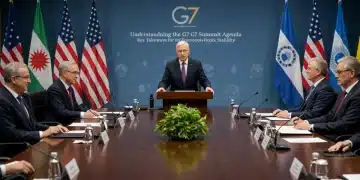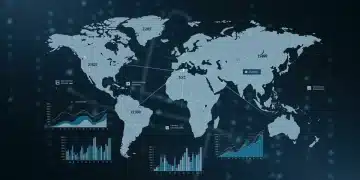
US Space Governance: New Regulations Expected by Mid-2025
The United States is poised to introduce significant new regulations concerning space governance by mid-2025, aiming to address the rapidly evolving commercial and national security challenges in orbit.

U.S. Policy Framework Update: Global Health Security 2025
The 2025 U.S. Policy Framework Update for Global Health Security outlines a comprehensive strategy to enhance national and international capacities for preventing, detecting, and responding to health threats, emphasizing proactive measures and collaborative efforts.

2025 G7 Summit Agenda: Key Takeaways for U.S. Economic Stability
The 2025 G7 Summit agenda is poised to address critical global economic challenges, with significant implications for U.S. economic stability, shaping future trade policies, climate initiatives, and geopolitical strategies.

World Bank 2025 Outlook: US Investment Repercussions
The World Bank's 2025 economic outlook predicts significant shifts in global growth, directly impacting U.S. investments abroad through evolving market conditions, policy changes, and risk profiles across various regions.

U.S. Role in Conflict Resolution: 2025 Diplomatic Initiatives
The U.S. role in international conflict resolution in 2025 will focus on proactive diplomacy, multilateral engagement, and strategic partnerships to address emerging global threats and foster lasting peace.

AI Geopolitics: What U.S. Citizens Need to Know Now
The geopolitical landscape of AI development is rapidly evolving, demanding U.S. citizens' attention to its profound implications on national security, economic stability, and daily life in the coming year.

Economic Implications of Global Energy Transitions for the U.S. by 2030
The global energy transition presents significant economic implications for the U.S. by 2030, influencing job markets, technological innovation, investment flows, and international competitiveness as the nation shifts towards sustainable energy sources.

Global Food Security Challenges: U.S. Policy in 2025
In 2025, U.S. agricultural policy faces complex global food security challenges, demanding innovative strategies to ensure a stable and sustainable food supply for both domestic and international populations.

U.S. Alliances: Shaping Global Future in the Next Decade
The future of U.S. international alliances is critical for global stability, requiring adaptive strategies to address evolving geopolitical landscapes, technological advancements, and new security challenges in the coming decade.

U.S. Supply Chain Realignments: What to Expect Next 18 Months
The U.S. faces significant global supply chain realignments in the next 18 months, driven by geopolitical tensions, technological innovation, and sustainability demands, impacting manufacturing, logistics, and consumer markets.